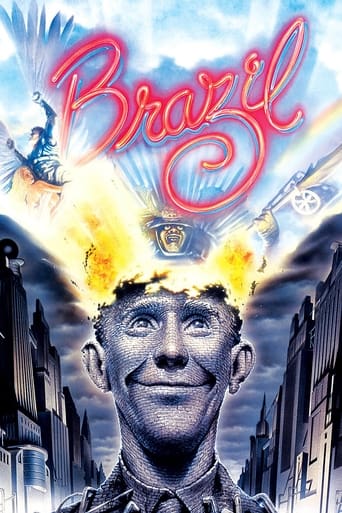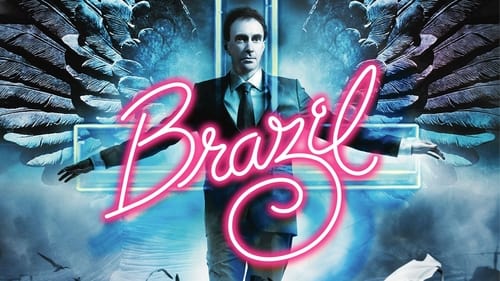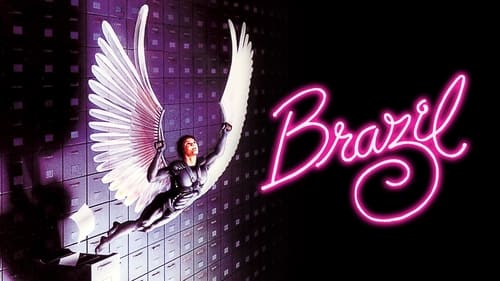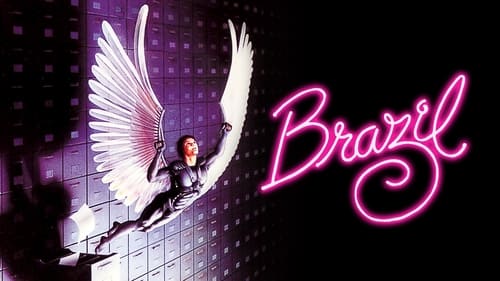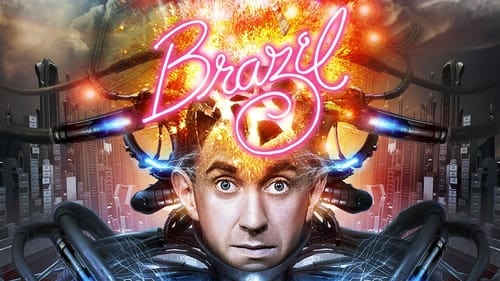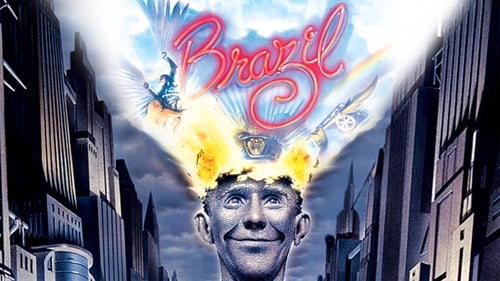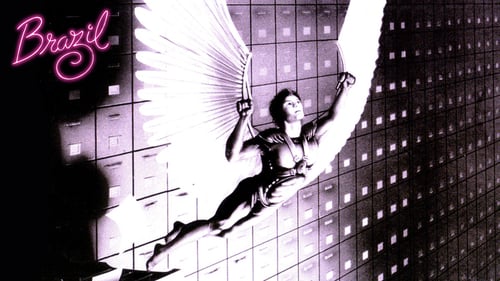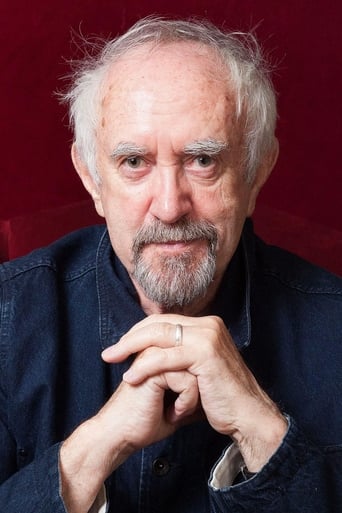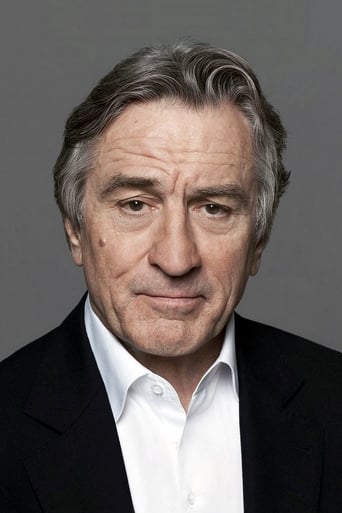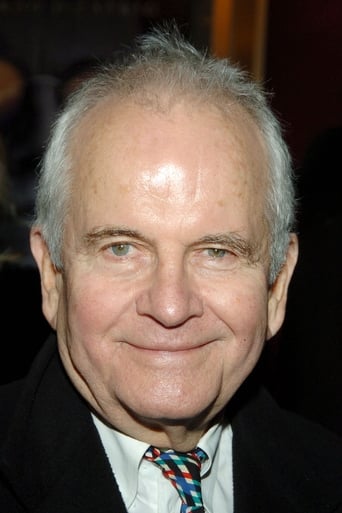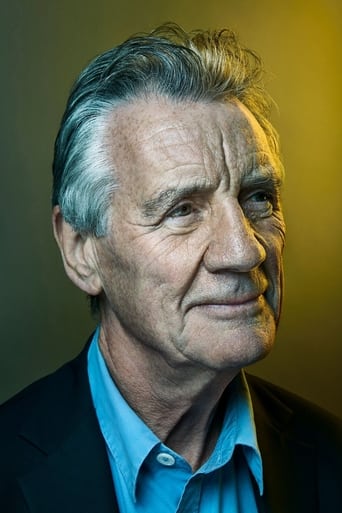Dalbert Pringle
When it comes to riotously insane, 1980's cinema - You've really gotta see Terry Giliam's "Brazil" for yourself to actually believe it. You really do.This off-the-wall, cinematic roller-coaster ride into a retro-future is, without question, all about a "world-gone-mad" where endless bureaucracy has, literally, buried man, neck-deep, in a technological mess.The hilariously convoluted script of "Brazil" was clearly written (back in 1985) with some surprising foresight - As its story still retains its relevancy in these times of technological over-load that we find ourselves living in at present.Visually quite impressive - "Brazil" may not appeal to everyone's tastes - But, if nothing else - It is certainly a very unique movie-experience that is bound to draw the viewer into its nightmare world in no time flat.
ElMaruecan82
"Brazil" has the title, the music and the creativity upon which masterpieces are made on, but it's like an irrepressible and suffocating twirling mass of the same paperwork that poison people's lives have taken over the plot, and it's only within its core that you can understand why this is such a great movie. But a better editing would have befitted such an ambitious plot, a pity Gilliam; the artist triumphed over the director. This is an artsy film with no direction.The last Gilliam film I watched was "The Fisher King" and it suffered the same syndrome. I enjoyed it but the story was never as brilliant and soul-penetrating as in the quieter and more realistic parts. It could have done without the Red Dragon hallucinations and even that Holy Grail subplot. But what Gilliams' movies say about him is that he has a sort of childlike obsession with "conflict" as something that can only be exposed through some big-scale extravaganza fights with high-tech effects and so forth, and that's exactly what almost ruined my enjoyment of "Brazil". The film is like a big party you're invited to, you enjoy yourself, you have fun, but because of two or three incidents, you're not sure you want to live the same experience again. Now, there's no doubt that the film is brilliant and it's a great satire against the overwhelming effect of bureaucracy and even technology (although it is displayed in a retro-futuristic way), we are all literate enough to get all the Orwellian vibes from the film, and even now, I can't imagine the hell of bureaucracy without that Brazilian tempo working in my mind. So, no one who criticized "Brazil" missed the point. But it's like Gilliam wants so much to emphasize the feeling of sheer confusion induced by the whole (mis)adventure that instead of making the story confusing by maintaining a solid plinth to the narrative, he made the experience of following the film, confusing as well. At one moment, you see Sam trying to find a woman, which in the actual setting is Herculean enough a task, and another moment, he's a warrior fighting a giant Samurai. I love some artistic licenses, but talk about overkill. Gilliam had a good story at hands but he goes for sensationalism while he had enough material to design something thrilling in the content, without going for such hyperbolic action sequences. The result is uneven and infuriating. When you trust your material, you don't need some pseudo psychedelic fights, chase sequences or other wall-crashing moments, action isn't always to be treated literally. Yes, this is a world that takes some monster Godzilla-like size, but I don't care that Gilliam wanted to pay homage to Kurosawa with the Samurai-figure, just make a tribute to "Ikiru" which was a real movie about bureaucracy, and it'll be fine. The same goes with the Brazilian escapist moments, first it's poetic and dreamlike, but they are so redundant that you don't know which story you're supposed to follow in the end. It says a lot about Gilliam and his tendency to make polarizing movies when they're no need for it. Indeed, we need a story, you can't make the cleverest satire without trying to confuse the audience but, it's like some suicidal impulse that is somewhat more fascinating than the film's content. I tried to watch "Brazil" twice, the first time, I fell asleep, the second, I turned it off because I was tired of trying to figure out what point he wanted to make with this or that scene. Now. I finally made it till the end, and while I acknowledge that there was some potential in this film and some scenes are nothing short but masterpieces: the Metropolis-like shots, any scene with Katharine Helmond and Ian Holm, and some brilliant little touches like the duct on the dog's poo-hole, this is still one of the cases where the final cut should've been shorter. The element that is constantly praised by the fans is the critics against bureaucracy, well, that makes the whole fights and chases quite useless, and what about the heart of the story: Sam? Sam Lowry, played by Jonathan Pryce, was a great character, the perfect straight man to this tragicomedy. Why not making him someone who really wants to go to Brazil? Why not creating some deeper connection with the woman, not just "curiosity"? How about the Harry Tuttle guy? The film had plenty of directions to take, but it just makes his main protagonist wander in a dystopian universe, encountering the most eccentric characters, and punctuate the film with a few actions sequences and weird nightmarish intrusions.I love the way Siskel described the movie: "It beautifully beats to death one point" He nails it. This is the film the expressions "insisting upon itself" was invented for, and even the whole bureaucracy thing is a bit overrated. I don't know if this review will be useful for anyone, but if I want a great and short satire about bureaucracy, I watch "The Place That Sends You Mad" segment from "The Twelve Tasks of Asterix". Now, that's perhaps the best critic against bureaucracy ever made, and it didn't need any special effects or fight sequences.As for "Brazil", Gilliam is one hell of a director and writer, but you know, there's a reason why they also give Oscars for "editing". As I said for another Gilliam's film, it's like the directing's style stealing the story's thunder.
John Brooks
Terry Gilliam writes and directs this, the dude who made the Monty Pythons. The Python influence is dearly felt here too, what with the awkward, bogus scenes of over-exaggerations and over-over-exaggerations. It also feels very Python-like in how light its purpose is. On one hand the film is extremely colorful, visually and artistically proficient, with meaning constantly coming symbolically/figuratively or implicitly, rather than explicitly; and on the other it indeed lacks depth at that. There is a little something lacking for this to be great and although it isn't far it assuredly isn't there either. Jonathan Pryce does a superb job as the lead in this dystopian comedy that is only as much a comedy as it is a tragic, depressing drama. The only hope resides in hopelessness, as the movie ultimately invites to believe. Like any 1984 'spinoff', this is heavy criticism of current society in its most gruesome portrait - like a nightmare; and threads of anything human still are scarce. Overall while the film offers serious doses of imagination and dream with all the aesthetics and abstract meaning entailed, I would reiterate it still feels a bit light as a whole, like it had all the right tools in hand but fell short of realizing its full potential in a more concrete way.
